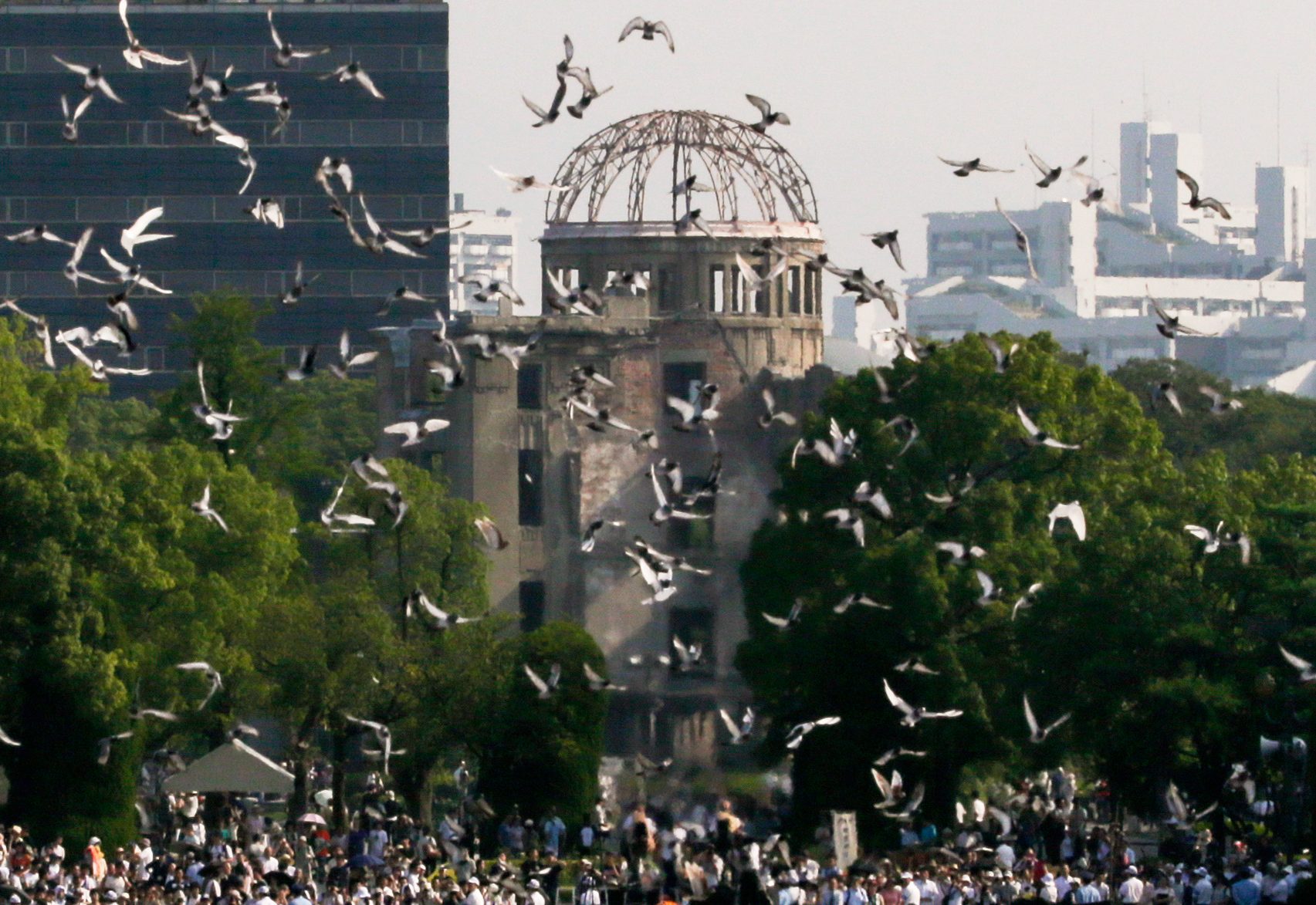SUMMARY
This is AI generated summarization, which may have errors. For context, always refer to the full article.

WASHINGTON, USA (UPDATED) – Barack Obama will this month become the first sitting US president to visit Hiroshima, but the White House is scotching talk of an apology for the devastating 1945 nuclear bombing of the city.
Obama, accompanied by Prime Minister Shinzo Abe, will make the deeply symbolic visit on May 27, after attending a G7 summit in south-central Japan, his spokesman Josh Earnest said Tuesday, May 10.
The White House described the trip as an effort to highlight the US “commitment to pursuing the peace and security of a world without nuclear weapons.”
On August 6, 1945, the US dropped the world’s first atomic bomb on Hiroshima, killing around 140,000 people, including those who survived the explosion itself but died soon after from severe radiation exposure.
Three days later, the US military dropped a plutonium bomb on the port city of Nagasaki, killing some 74,000 people.
The announcement comes after months of speculation in the US and Japan that the president, a Nobel peace laureate, would pay a visit to the city.
The bombings remain controversial in the United States and around the world.
Opinion is sharply divided on whether president Harry Truman’s decision ended the brutality of World War II and avoided a bloody US invasion of Japan, or whether dropping nuclear weapons on a civilian area constitutes a war crime.
A Pew poll last year showed 56% of Americans think the bombing was justified, while 14% of Japanese do. In both countries, approval of Truman’s order has waned dramatically over the years.
The White House has expressed understanding at the dilemma Truman faced.
“I think what the president would say is that it’s hard to put yourself in that position from the outside,” Earnest said.
“I think what the president does appreciate is that President Truman made this decision for the right reasons. President Truman was focused on the national security interests of the United States… on bringing an end to a terrible war. And President Truman made this decision fully mindful of the likely human toll.”
“I think it’s hard to look back and second-guess it too much.”
No apology
In Hiroshima, Obama will visit the once ruined city’s Peace Memorial Park “where he will share his reflections on the significance of the site and the events that occurred there,” said senior Obama foreign policy advisor Ben Rhodes.
Last month, Secretary of State John Kerry became the highest ranking US political figure to visit Hiroshima.
Kerry said he was “deeply moved” by the experience and called a museum at the site a “gut-wrenching display that tugs at all your sensibilities as a human being.”
“Everyone should visit Hiroshima, and everyone means everyone,” he added, fueling speculation that Obama would go.
Abe welcomed the White House announcement, saying: “We want to make this visit an opportunity for both Japan and the US to mourn all the victims.”
“It is significant for him to send a message of his determination for a nuclear-free world. For a US president, it was a big decision,” he said.
Japan has long urged world leaders to visit Hiroshima and Nagasaki to see the horrors of the atomic bombings and join efforts to eradicate nuclear arms.
A UN spokesman said Secretary-General Ban Ki-moon “very much welcomes” Obama’s decision and expressed hope that the visit will highlight the need to abolish nuclear weapons once and for all.
But some have been concerned that Obama’s visit would be seen as an apology for events of 7 decades ago.
The move is likely to rile Obama’s opponents and some in the military, whose predecessors carried out presidential orders to drop the bombs.
The visit will come at a particularly sensitive time. This December marks the 75th anniversary of Japan’s attack on Pearl Harbor, in Obama’s home state of Hawaii.
But the White House was eager to stress that Obama’s visit is not an apology.
“He will not revisit the decision to use the atomic bomb at the end of World War II. Instead, he will offer a forward-looking vision focused on our shared future,” said Rhodes.
The visit is likely to have regional reverberations, at a time when North Korea, a short distance away, is aggressively pursuing its nuclear and ballistic missiles development program.
At a 4-day Communist Party confab that ended on Monday, May 9, Pyongyang’s enigmatic leaders vowed to continue building weapons systems that have already prompted deep international sanctions, opprobrium, and isolation.
Japan’s neighbors in China and South Korea will also be watching the visit closely, always eager to make sure that their once hyper-aggressive foe is not allowed to play the role of a World War II victim.
Before his visit to Japan, Obama will head to Vietnam for talks on advancing cooperation on trade, security, and human rights, the White House said. – Andrew Beatty, AFP / Rappler.com
Add a comment
How does this make you feel?
There are no comments yet. Add your comment to start the conversation.